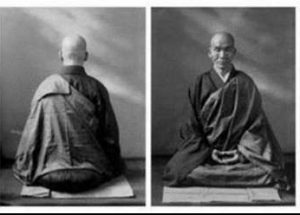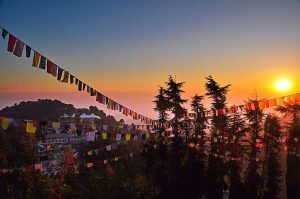
Vows addressed to the “human and celestial beings in that land”
Amitabha Buddha was very systematic in making his vows. The first 11 vows address the status of human and celestial beings in his Land of Bliss. One reason for this was to draw the attention of the human and celestial beings in other worlds so that they, too, would admire the sublime beauty and spiritual perfection of the Pure Land and aspire to be reborn there.
In Amitabha’s first two vows, the status of never falling into the Three Wretched Realms is emphasized. For the following nine vows, the physical and spiritual endowments of the inhabitants of the Land of Bliss are highlighted. Moreover, all these benefits will remain unchanged until an inhabitant’s life comes to an end in the Land of Bliss. But what does “come to an end” mean?
Three vows addressing the lifespan of living beings in the Land of Bliss
In the Amitabha Sutra, it says:
“Shariputra, the lives of the Buddha and the people in his land last for immeasurable, unlimited and incalculable kalpas. It is for this reason that the Buddha is called ‘Amida’ (Amitayus).”
Among Amitabha’s 48 vows, there are three vows—the 2nd, 11th, and 22nd Vows, which speak about the lifespan of living beings in the Land of Bliss.
As Amitabha’s life is infinite, so too it would seem are the lifespans of the beings in the Land of Bliss. However, Amitabha’s Second Vow states as follows:
If, when I attain Buddhahood, humans and devas in my land should fall again into the Three Wretched Realms when their life comes to the end, may I not attain perfect Enlightenment.
It seems that the two statements above are contradictory. How do we resolve this contradiction and come to a definitive understanding? To do this, we must look to Amitabha’s 15th Vow, which states:
If, when I attain Buddhahood, humans and devas in my land should have limited lifespans, except when they wish to shorten them in accordance with their original vows, may I not attain perfect Enlightenment.
This vow clarifies the doubt about the lifespan of living beings in Amitabha’s Land of Bliss. If a living being would like to stay in the Land of Bliss, they will enjoy their lifespan for as long as they wish. However, if they wish to shorten their lifespan in accordance with their “original vows,” their life will naturally come to an end with their aspiration to leave the Land of Bliss.
Why does a living being wish to end their life in the Land of Bliss and leave?
What is meant by “original vow?” This is the vow made by a living being on the Path of Sages before their rebirth in the Land of Bliss. As Vasubandhu Bodhisattva points out, the Land of Bliss is a realm for those have cultivated the virtuous root of the Mahayana, and the original vow of all Bodhisattvas must be the unsurpassed Bodhi Mind—to pursue the Buddhist Way above and deliver all sentient beings below.
This interpretation is verified if we carefully read Amitabha’s 22nd Vow:
If, when I attain Buddhahood, bodhisattvas in the Buddha-lands of other quarters who visit my land should not ultimately and unfailingly reach the Stage of Becoming a Buddha after One More Life, may I not attain perfect Enlightenment.
Excepted are those who wish to teach and guide sentient beings in accordance with their original vows. For they wear the armour of great vows, accumulate merits, deliver all beings from birth-and-death, visit Buddha-lands to perform the bodhisattva practices, make offerings to Buddhas, Tathagatas, throughout the ten quarters, enlighten uncountable sentient beings as numerous as the sands of the River Ganges, and establish them in the highest, perfect Enlightenment.
Such bodhisattvas transcend the course of practice of the ordinary bodhisattvas, manifest the practices of all the bodhisattva stages, and cultivate the virtues of universal benevolences.
We discussed this vow in my earlier article: “Do you want to become a Buddha like Shakyamuni? asks Amitabha.”
The Pure Land way is the ultimate teaching leading us back to our original home
In other words, living beings leave a splendid reward land, like the Land of Bliss, and return to a defiled manifested land, like our world of the Land of Saha, to deliver ordinary beings that reincarnate within the Three Domains and the Six Realms. In this way, they re-enact what Shakyamuni Buddha himself did:
1. They visit countless buddha-lands to perform bodhisattva practices,
2. They make offerings to buddhas, tathagatas, throughout the ten quarters, and,
3. They enlighten countless sentient beings.
When they return to the defiled manifested lands of the Six Realms, Amitabha Buddha guarantees that they will not fall again into the Three Wretched Realms when their life comes to an end, as stated in the Second Vow. They will appear as either human or heavenly beings to preach the Buddhist teachings for the deliverance of those in the Saha world.
Among all the Buddhist teachings, the most important one is, of course, Amitabha’s teaching of deliverance through his Name, so that sentient beings can attain rebirth in the Land of Bliss. This happens through recourse to Amitabha’s Fundamental Vow (the 18th vow) and allows all those who are reborn to become Buddha-like beings.
If we also reference Amitabha’s 17th Vow:
If, when I attain Buddhahood, innumerable Buddhas in the land of the 10 quarters should not all praise and glorify my Name, may I not attain perfect Enlightenment
We should know that all Buddhas of the 10 directions who appear in the worlds of the 10 directions, are dispatched from Amitabha’s Land of Bliss with the mission to introduce and extol Amitabha’s Name to all sentient beings in the 10 directions.
In this respect, the Pure Land teaching of deliverance through Amitabha’s Name is the ultimate teaching to lead all sentient beings back to their original home—the Buddhas’ realm of unconditioned Nirvana. Namo Amituofo!
Related features from Buddhistdoor Global
The Deep Meaning of Amitabha’s First Vow
Situating Amitabha’s 18th Vow Among the 48 Vows
Categorizing Amitabha’s 48 Vows in the Infinite Life Sutra












Namo Amituofo